airbag MERCEDES-BENZ A-CLASS HATCHBACK 2015 Owners Manual
[x] Cancel search | Manufacturer: MERCEDES-BENZ, Model Year: 2015, Model line: A-CLASS HATCHBACK, Model: MERCEDES-BENZ A-CLASS HATCHBACK 2015Pages: 417, PDF Size: 11.91 MB
Page 7 of 417
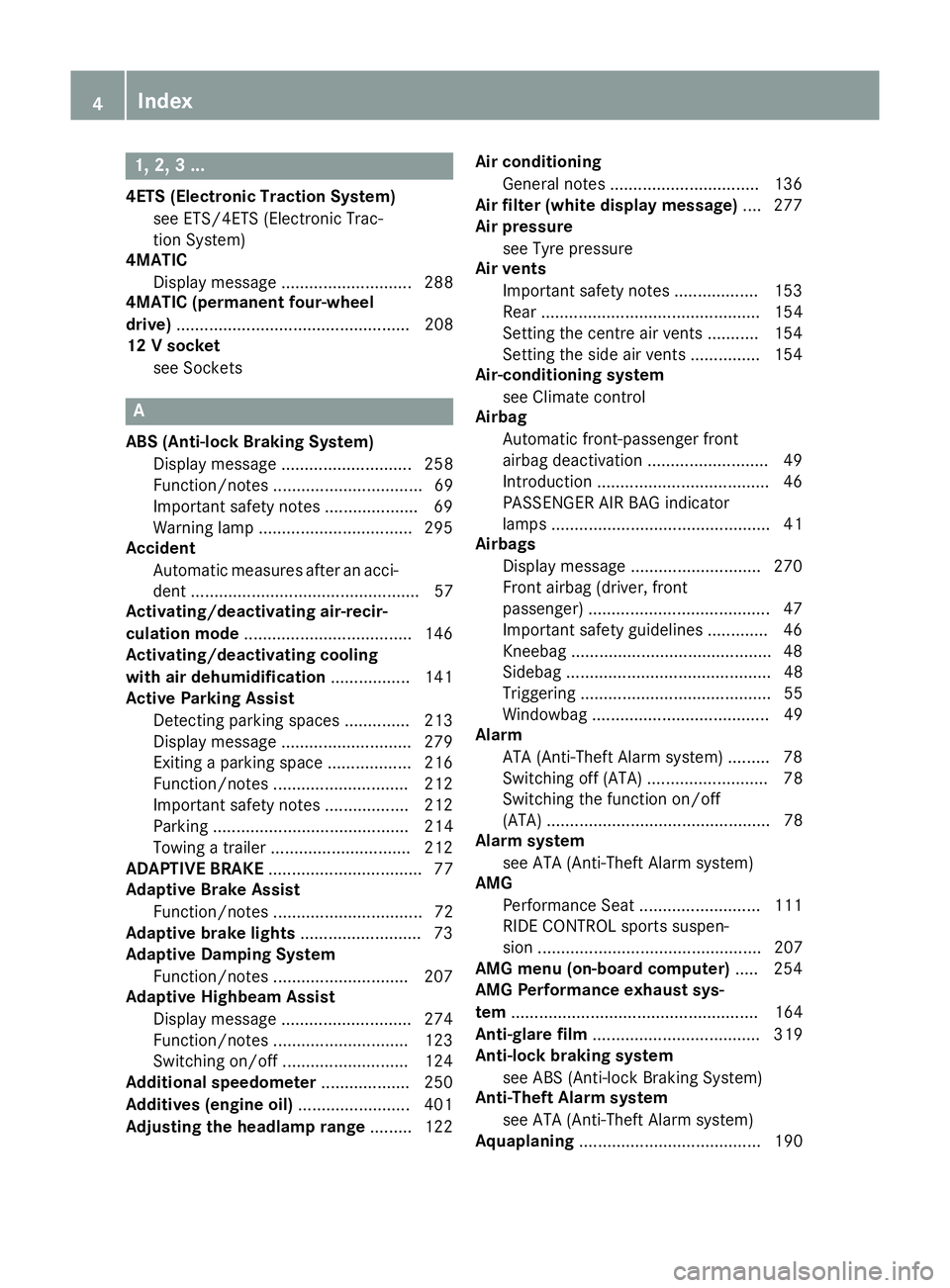
1, 2, 3 ...
4ETS (Electronic Traction System) see ETS/4ETS (Electronic Trac-
tion System)
4MATIC
Display message ............................ 288
4MATIC (permanent four-wheel
drive) .................................................. 208
12 V socket
see Sockets A
ABS (Anti-lock Braking System) Display message ............................ 258
Function/notes ................................ 69
Important safety notes .................... 69
Warning lamp .................................2 95
Accident
Automatic measures after an acci-
dent ................................................. 57
Activating/deactivating air-recir-
culation mode ................................... .146
Activating/deactivating cooling
with air dehumidification ................. 141
Active Parking Assist
Detecting parking spaces .............. 213
Display message ............................ 279
Exiting a parking space .................. 216
Function/notes ............................ .212
Important safety notes .................. 212
Parking .......................................... 214
Towing a trailer .............................. 212
ADAPTIVE BRAKE ................................. 77
Adaptive Brake Assist
Function/notes ................................ 72
Adaptive brake lights .......................... 73
Adaptive Damping System
Function/notes ............................ .207
Adaptive Highbeam Assist
Display message ............................ 274
Function/notes ............................ .123
Switching on/off ........................... 124
Additional speedometer ................... 250
Additives (engine oil) ........................ 401
Adjusting the headlamp range ......... 122Air conditioning
General notes ................................ 136
Air filter (white display message) .... 277
Air pressure
see Tyre pressure
Air vents
Important safety notes .................. 153
Rear ............................................... 154
Setting the centre air vents ........... 154
Setting the side air vents .............. .154
Air-conditioning system
see Climate control
Airbag
Automatic front-passenger front
airbag deactivatio n .......................... 49
Introduction ..................................... 46
PASSENGER AIR BAG indicator
lamps ............................................... 41
Airbags
Display message ............................ 270
Front airbag (driver, front
passenger) ....................................... 47
Important safety guidelines ............. 46
Kneebag .......................................... .48
Sidebag ............................................ 48
Triggering ......................................... 55
Windowbag ...................................... 49
Alarm
ATA (Anti-Theft Alarm system) ......... 78
Switching off (ATA) .......................... 78
Switching the function on/off
(ATA) ................................................ 78
Alarm system
see ATA (Anti-Theft Alarm system)
AMG
Performance Seat .......................... 111
RIDE CONTROL sports suspen-
sion ................................................ 207
AMG menu (on-board computer) ..... 254
AMG Performance exhaust sys-
tem ..................................................... 164
Anti-glare film .................................... 319
Anti-lock braking system
see ABS (Anti-lock Braking System)
Anti-Theft Alarm system
see ATA (Anti-Theft Alarm system)
Aquaplaning ....................................... 1904
Index
Page 8 of 417
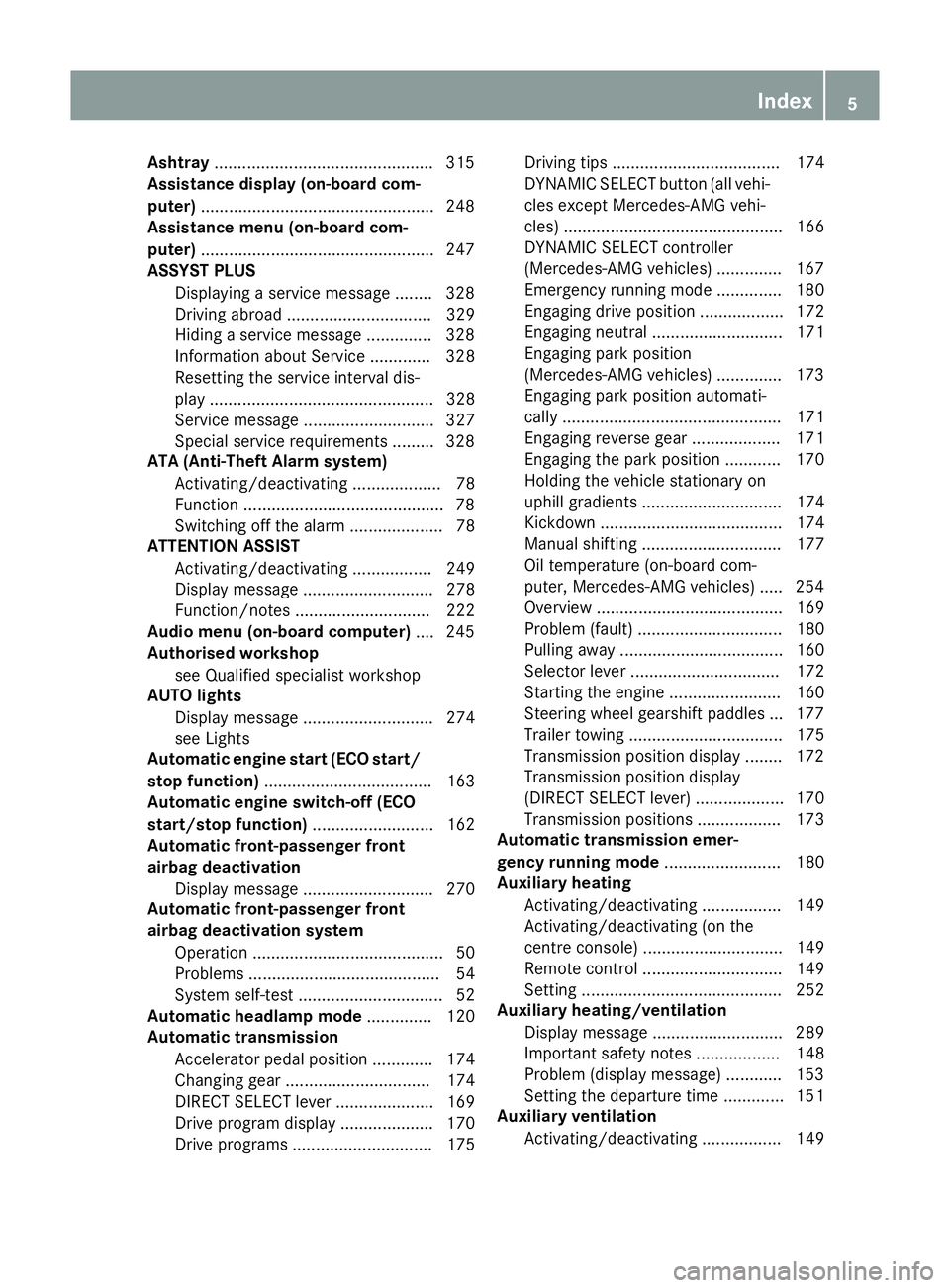
Ashtray
.............................................. .315
Assistance display (on-board com-
puter) ................................................. .248
Assistance menu (on-board com-
puter) ................................................. .247
ASSYST PLUS
Displaying a service message ....... .328
Driving abroad ............................... 329
Hiding a service message .............. 328
Information about Service ............. 328
Resetting the service interval dis-
play ................................................ 328
Service message ............................ 327
Special service requirements ......... 328
ATA (Anti-Theft Alarm system)
Activating/deactivating ................... 78
Function .......................................... .78
Switching off the alarm .................... 78
ATTENTION ASSIST
Activating/deactivating ................. 249
Display message ............................ 278
Function/note s............................. 222
Audio menu (on-board computer) .... 245
Authorised workshop
see Qualified specialist workshop
AUTO lights
Display message ............................ 274
see Lights
Automatic engine start (ECO start/
stop function) .................................... 163
Automatic engine switch-off (ECO
start/stop function) .......................... 162
Automatic front-passenger front
airbag deactivation
Display message ............................ 270
Automatic front-passenger front
airbag deactivation system
Operation ......................................... 50
Problems ......................................... 54
System self-test ............................... 52
Automatic headlamp mode .............. 120
Automatic transmission
Accelerator pedal position ............. 174
Changing gear ............................... 174
DIRECT SELECT lever ..................... 169
Drive program display .................... 170
Drive programs .............................. 175 Driving tips .................................... 174
DYNAMIC SELECT button (all vehi-
cles except Mercedes-AMG vehi-
cles) ............................................... 166
DYNAMIC SELECT controller
(Mercedes-AMG vehicles) .............. 167
Emergency running mod e.............. 180
Engaging drive position .................. 172
Engaging neutral ............................ 171
Engaging park position
(Mercedes-AMG vehicles) .............. 173
Engaging park position automati-
cally ............................................... 171
Engaging reverse gear ................... 171
Engaging the park position ............ 170
Holding the vehicle stationary on
uphill gradients .............................. 174
Kickdown ....................................... 174
Manual shifting .............................. 177
Oil temperature (on-board com-
puter, Mercedes-AMG vehicles) ..... 254
Overview ........................................ 169
Problem (fault) ............................... 180
Pulling away ................................... 160
Selector lever ................................ 172
Starting the engine ........................ 160
Steering wheel gearshift paddle s... 177
Trailer towing ................................. 175
Transmission position display ........ 172
Transmission position display
(DIRECT SELECT lever) ................... 170
Transmission positions .................. 173
Automatic transmission emer-
gency running mode ......................... 180
Auxiliary heating
Activating/deactivating ................. 149
Activating/deactivating (on the
centre console ).............................. 149
Remote control .............................. 149
Setting ........................................... 252
Auxiliary heating/ventilation
Display message ............................ 289
Important safety notes .................. 148
Problem (display message) ............ 153
Setting the departure time ............. 151
Auxiliary ventilation
Activating/deactivating ................. 149 Index
5
Page 14 of 417
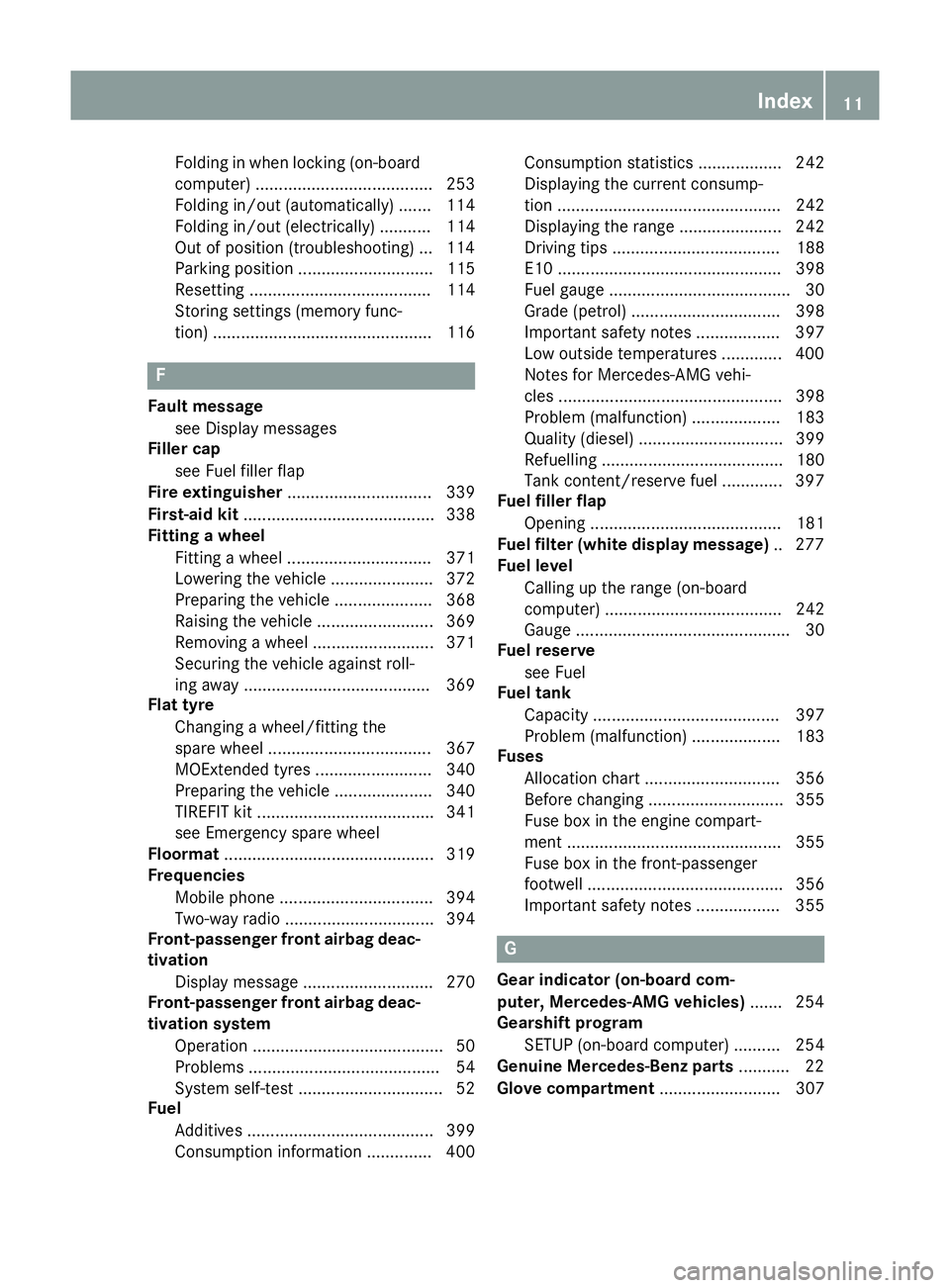
Folding in when locking (on-board
computer) ...................................... 253
Folding in/out (automatically )....... 114
Folding in/out (electrically) ........... 114
Out of position (troubleshooting) ... 114
Parking position ............................. 115
Resetting ....................................... 114
Storing settings (memory func-
tion) ............................................... 116 F
Fault message see Display messages
Filler cap
see Fuel filler flap
Fire extinguisher ............................... 339
First-aid kit ......................................... 338
Fitting a wheel
Fitting a wheel ............................... 371
Lowering the vehicle ...................... 372
Preparing the vehicle ..................... 368
Raising the vehicle ......................... 369
Removing a wheel .......................... 371
Securing the vehicle against roll-
ing away ........................................ 369
Flat tyre
Changing a wheel/fitting the
spare wheel ................................... 367
MOExtended tyre s......................... 340
Preparing the vehicle ..................... 340
TIREFIT kit ...................................... 341
see Emergency spare wheel
Floormat ............................................. 319
Frequencies
Mobile phone ................................. 394
Two-way radio ................................ 394
Front-passenger front airbag deac-
tivation
Display message ............................ 270
Front-passenger front airbag deac-
tivation system
Operation ......................................... 50
Problems ......................................... 54
System self-test ............................... 52
Fuel
Additives ........................................ 399
Consumption information .............. 400 Consumption statistics .................. 242
Displaying the current consump-
tion ................................................ 242
Displaying the range ...................... 242
Driving tip
s.................................... 188
E10 ................................................ 398
Fuel gaug e....................................... 30
Grade (petrol) ................................ 398
Important safety notes .................. 397
Low outside temperatures ............. 400
Notes for Mercedes‑ AMG vehi-
cles ................................................ 398
Problem (malfunction) ................... 183
Quality (diesel )............................... 399
Refuelling ....................................... 180
Tank content/reserve fue l............. 397
Fuel filler flap
Opening ......................................... 181
Fuel filter (white display message) .. 277
Fuel level
Calling up the range (on-board
computer) ...................................... 242
Gauge .............................................. 30
Fuel reserve
see Fuel
Fuel tank
Capacity ........................................ 397
Problem (malfunction) ................... 183
Fuses
Allocation chart ............................. 356
Before changing ............................. 355
Fuse box in the engine compart-
ment .............................................. 355
Fuse box in the front-passenger
footwell .......................................... 356
Important safety notes .................. 355 G
Gear indicator (on-board com-
puter, Mercedes-AMG vehicles) ....... 254
Gearshift program
SETUP (on-board computer) .......... 254
Genuine Mercedes-Benz parts ........... 22
Glove compartment .......................... 307 Index
11
Page 17 of 417
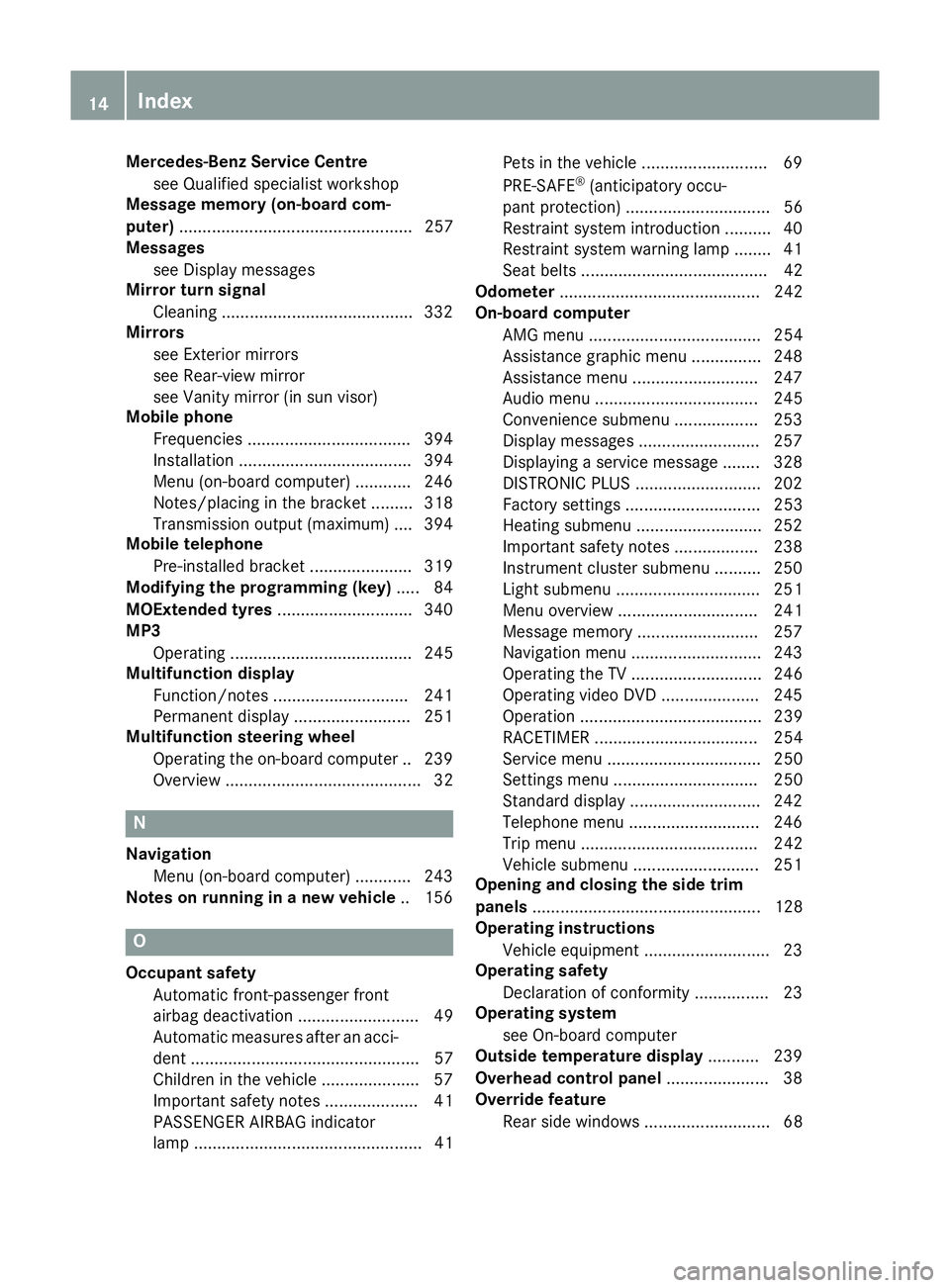
Mercedes-Benz Service Centre
see Qualified specialist workshop
Message memory (on-board com-
puter) .................................................. 257
Messages
see Display messages
Mirror turn signal
Cleaning ........................................ .332
Mirrors
see Exterior mirrors
see Rear-view mirror
see Vanity mirror (in sun visor)
Mobile phone
Frequencies ................................... 394
Installation ..................................... 394
Menu (on-board computer) ............ 246
Notes/placing in the bracket ......... 318
Transmission output (maximum) .... 394
Mobile telephone
Pre-installed bracket ..................... .319
Modifying the programming (key) ..... 84
MOExtended tyres .............................340
MP3
Operating ....................................... 245
Multifunction display
Function/notes ............................ .241
Permanent display ......................... 251
Multifunction steering wheel
Operating the on-board computer .. 239
Overview .......................................... 32 N
Navigation Menu (on-board computer) ............ 243
Notes on running in a new vehicle .. 156O
Occupant safety Automatic front-passenger front
airbag deactivatio n.......................... 49
Automatic measures after an acci-
dent ................................................. 57
Children in the vehicle ..................... 57
Important safety notes .................... 41
PASSENGER AIRBAG indicator
lamp ................................................. 41 Pets in the vehicle ........................... 69
PRE-SAFE
®
(anticipatory occu-
pant protection) ............................... 56
Restraint system introduction .......... 40
Restraint system warning lamp ........ 41
Seat belts ........................................ 42
Odometer ........................................... 242
On-board computer
AMG menu ..................................... 254
Assistance graphic menu ............... 248
Assistance menu ........................... 247
Audio menu ................................... 245
Convenience submenu .................. 253
Display messages .......................... 257
Displaying a service message ........ 328
DISTRONIC PLUS ........................... 202
Factory settings ............................. 253
Heating submenu ........................... 252
Important safety notes .................. 238
Instrument cluster submenu .......... 250
Light submenu ............................... 251
Menu overview .............................. 241
Message memory .......................... 257
Navigation menu ............................ 243
Operating the TV ............................ 246
Operating video DVD ..................... 245
Operation ....................................... 239
RACETIMER ................................... 254
Service menu ................................. 250
Settings menu ............................... 250
Standard display ............................ 242
Telephone menu ............................ 246
Trip menu ...................................... 242
Vehicle submenu ........................... 251
Opening and closing the side trim
panels ................................................. 128
Operating instructions
Vehicle equipment ........................... 23
Operating safety
Declaration of conformity ................ 23
Operating system
see On-board computer
Outside temperature display ........... 239
Overhead control panel ...................... 38
Override feature
Rear side window s........................... 68 14
Index
Page 25 of 417
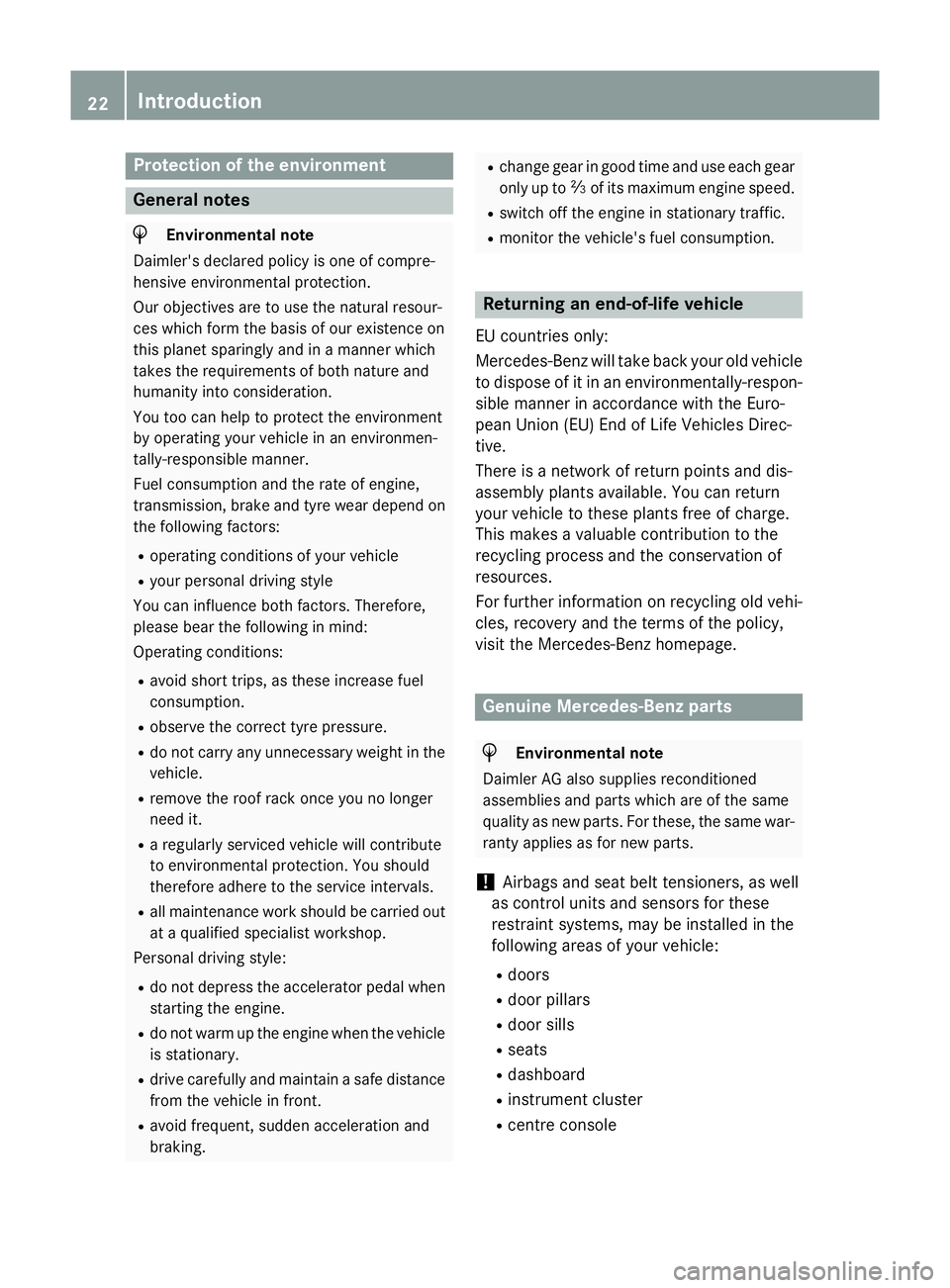
Protection of the environment
General notes
H
Environmental note
Daimler's declared policy is one of compre-
hensive environmental protection.
Our objectives are to use the natural resour-
ces which form the basis of our existence on
this planet sparingly and in a manner which
takes the requirements of both nature and
humanity into consideration.
You too can help to protect the environment
by operating your vehicle in an environmen-
tally-responsible manner.
Fuel consumption and the rate of engine,
transmission, brake and tyre wear depend on
the following factors:
R operating conditions of your vehicle
R your personal driving style
You can influence both factors. Therefore,
please bear the following in mind:
Operating conditions:
R avoid short trips, as these increase fuel
consumption.
R observe the correct tyre pressure.
R do not carry any unnecessary weight in the
vehicle.
R remove the roof rack once you no longer
need it.
R a regularly serviced vehicle will contribute
to environmental protection. You should
therefore adhere to the service intervals.
R all maintenance work should be carried out
at a qualified specialist workshop.
Personal driving style:
R do not depress the accelerator pedal when
starting the engine.
R do not warm up the engine when the vehicle
is stationary.
R drive carefully and maintain a safe distance
from the vehicle in front.
R avoid frequent, sudden acceleration and
braking. R
change gear in good time and use each gear
only up to Ôof its maximum engine speed.
R switch off the engine in stationary traffic.
R monitor the vehicle's fuel consumption. Returning an end-of-life vehicle
EU countries only:
Mercedes-Benz will take back your old vehicle to dispose of it in an environmentally-respon-sible manner in accordance with the Euro-
pean Union (EU) End of Life Vehicles Direc-
tive.
There is a network of return points and dis-
assembly plants available. You can return
your vehicle to these plants free of charge.
This makes a valuable contribution to the
recycling process and the conservation of
resources.
For further information on recycling old vehi- cles, recovery and the terms of the policy,
visit the Mercedes-Benz homepage. Genuine Mercedes-Benz parts
H
Environmental note
Daimler AG also supplies reconditioned
assemblies and parts which are of the same
quality as new parts. For these, the same war-
ranty applies as for new parts.
! Airbags and seat belt tensioners, as well
as control units and sensors for these
restraint systems, may be installed in the
following areas of your vehicle:
R doors
R door pillars
R door sills
R seats
R dashboard
R instrument cluster
R centre console 22
Introduction
Page 28 of 417
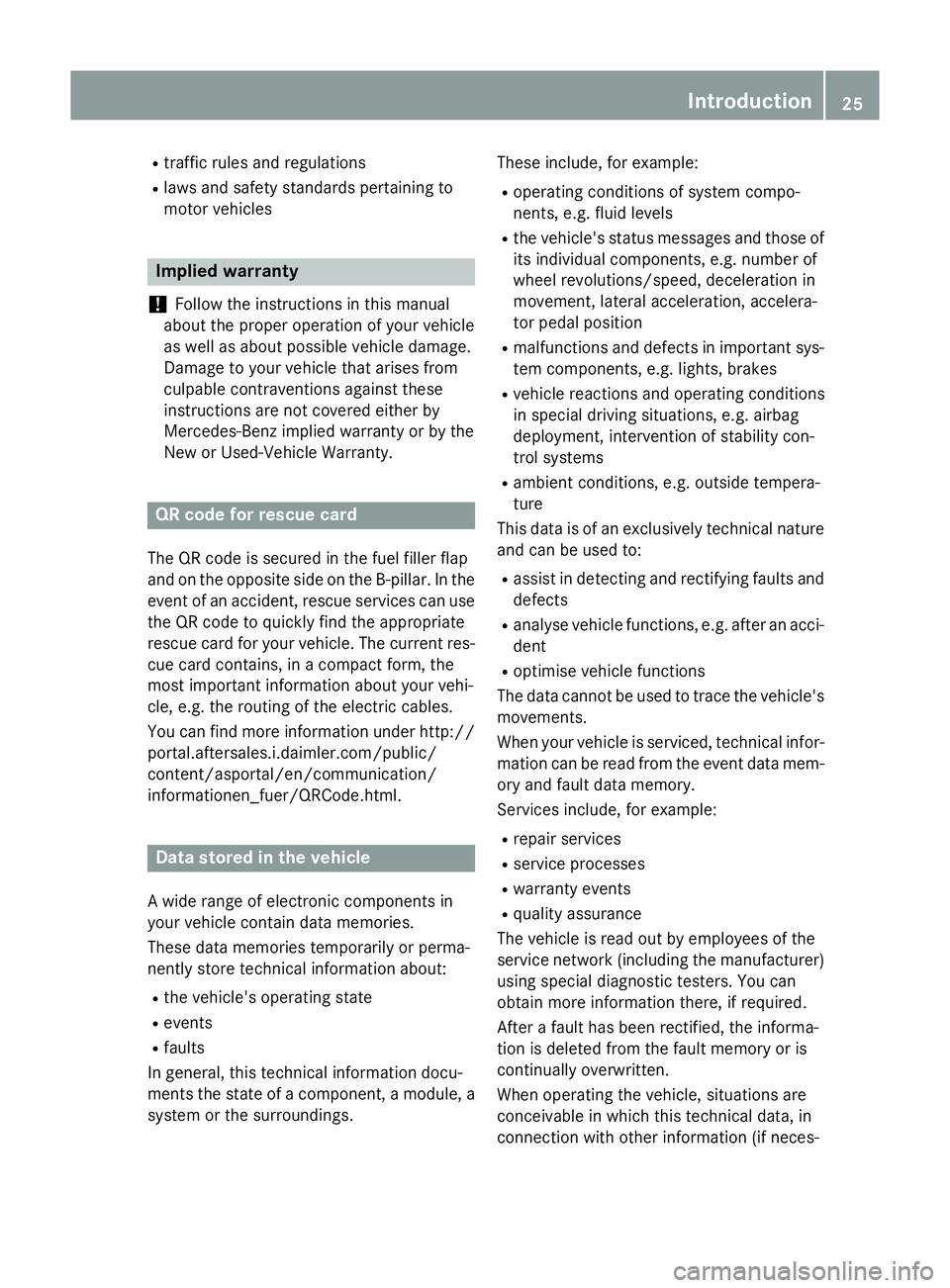
R
traffic rules and regulations
R laws and safety standards pertaining to
motor vehicles Implied warranty
! Follow the instructions in this manual
about the proper operation of your vehicle
as well as about possible vehicle damage.
Damage to your vehicle that arises from
culpable contraventions against these
instructions are not covered either by
Mercedes-Benz implied warranty or by the
New or Used-Vehicle Warranty. QR code for rescue card
The QR code is secured in the fuel filler flap
and on the opposite side on the B-pillar. In the
event of an accident, rescue services can use the QR code to quickly find the appropriate
rescue card for your vehicle. The current res-
cue card contains, in a compact form, the
most important information about your vehi-
cle, e.g. the routing of the electric cables.
You can find more information under http:// portal.aftersales.i.daimler.com/public/
content/asportal/en/communication/
informationen_fuer/QRCode.html. Data stored in the vehicle
A wide range of electronic components in
your vehicle contain data memories.
These data memories temporarily or perma-
nently store technical information about:
R the vehicle's operating state
R events
R faults
In general, this technical information docu-
ments the state of a component, a module, a
system or the surroundings. These include, for example:
R operating conditions of system compo-
nents, e.g. fluid levels
R the vehicle's status messages and those of
its individual components, e.g. number of
wheel revolutions/speed, deceleration in
movement, lateral acceleration, accelera-
tor pedal position
R malfunctions and defects in important sys-
tem components, e.g. lights, brakes
R vehicle reactions and operating conditions
in special driving situations, e.g. airbag
deployment, intervention of stability con-
trol systems
R ambient conditions, e.g. outside tempera-
ture
This data is of an exclusively technical nature and can be used to:
R assist in detecting and rectifying faults and
defects
R analyse vehicle functions, e.g. after an acci-
dent
R optimise vehicle functions
The data cannot be used to trace the vehicle's movements.
When your vehicle is serviced, technical infor-
mation can be read from the event data mem- ory and fault data memory.
Services include, for example:
R repair services
R service processes
R warranty events
R quality assurance
The vehicle is read out by employees of the
service network (including the manufacturer)
using special diagnostic testers. You can
obtain more information there, if required.
After a fault has been rectified, the informa-
tion is deleted from the fault memory or is
continually overwritten.
When operating the vehicle, situations are
conceivable in which this technical data, in
connection with other information (if neces- Introduction
25 Z
Page 37 of 417
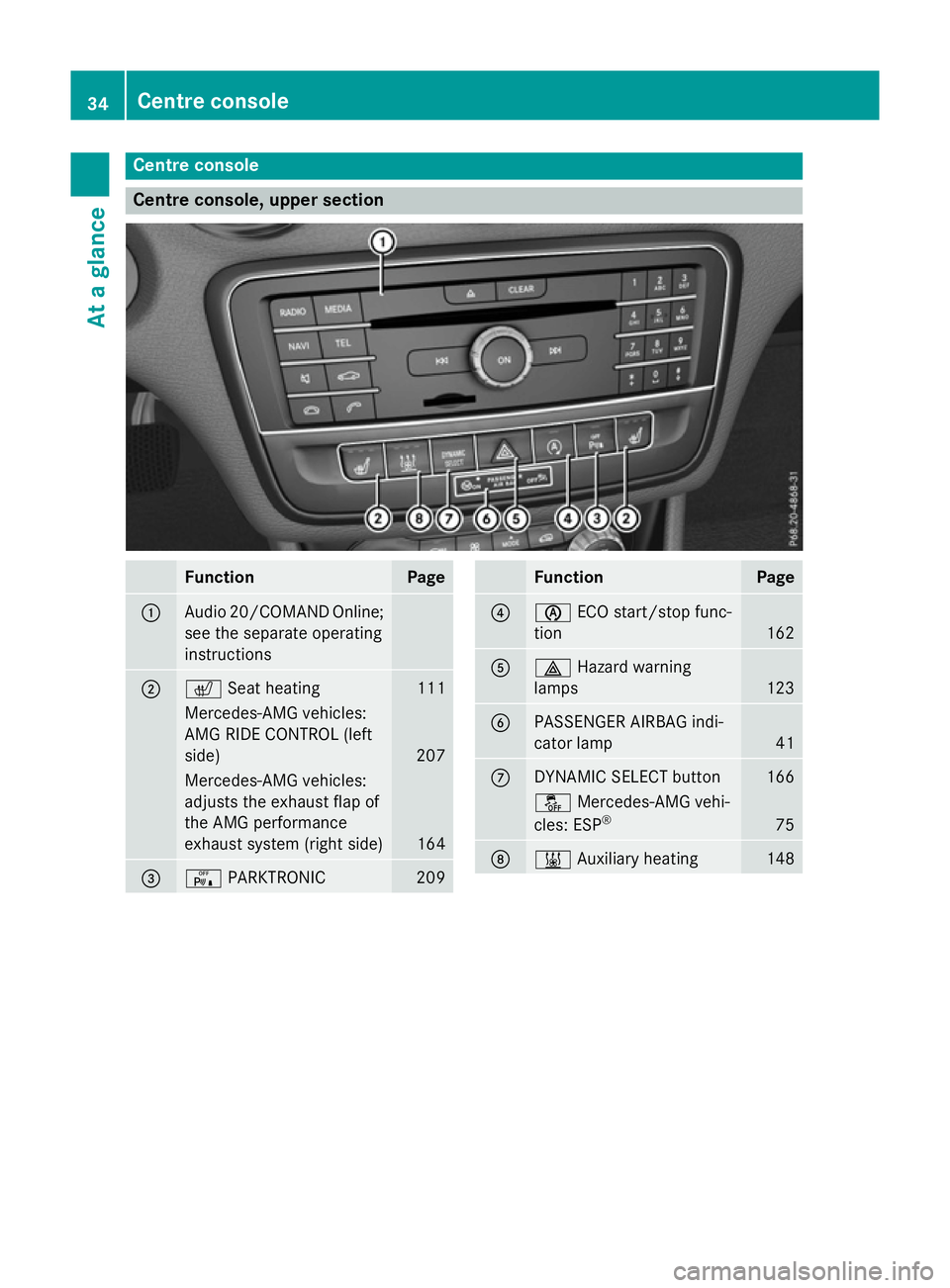
Centre console
Centre console, upper section
Function Page
:
Audio 20/COMAND Online;
see the separate operating
instructions ;
c
Seat heating 111
Mercedes-AMG vehicles:
AMG RIDE CONTROL (left
side)
207
Mercedes-AMG vehicles:
adjusts the exhaust flap of
the AMG performance
exhaust system (right side) 164
=
c
PARKTRONIC 209 Function Page
?
è
ECO start/stop func-
tion 162
A
£
Hazard warning
lamps 123
B
PASSENGER AIRBAG indi-
cator lamp
41
C
DYNAMIC SELECT button 166
å
Mercedes-AMG vehi-
cles: ESP ® 75
D
&
Auxiliary heating 14834
Centre consoleAt a glance
Page 43 of 417
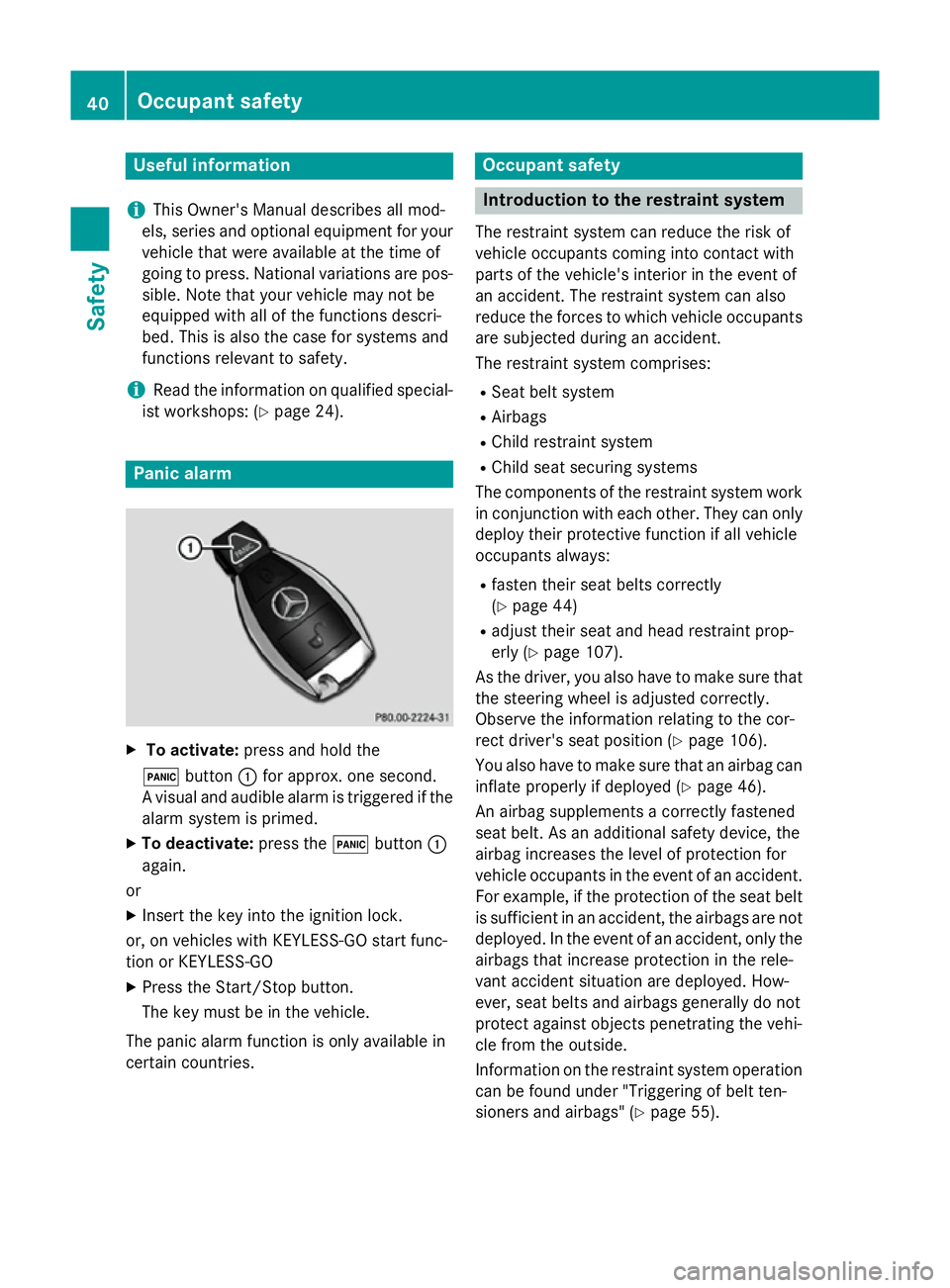
Useful information
i This Owner's Manual describes all mod-
els, series and optional equipment for your
vehicle that were available at the time of
going to press. National variations are pos- sible. Note that your vehicle may not be
equipped with all of the functions descri-
bed. This is also the case for systems and
functions relevant to safety.
i Read the information on qualified special-
ist workshops: (Y page 24). Panic alarm
X
To activate: press and hold the
! button :for approx. one second.
A visual and audible alarm is triggered if the alarm system is primed.
X To deactivate: press the!button :
again.
or
X Insert the key into the ignition lock.
or, on vehicles with KEYLESS-GO start func-
tion or KEYLESS ‑GO
X Press the Start/Stop button.
The key must be in the vehicle.
The panic alarm function is only available in
certain countries. Occupant safety
Introduction to the restraint system
The restraint system can reduce the risk of
vehicle occupants coming into contact with
parts of the vehicle's interior in the event of
an accident. The restraint system can also
reduce the forces to which vehicle occupants
are subjected during an accident.
The restraint system comprises:
R Seat belt system
R Airbags
R Child restraint system
R Child seat securing systems
The components of the restraint system work
in conjunction with each other. They can only
deploy their protective function if all vehicle
occupants always:
R fasten their seat belts correctly
(Y page 44)
R adjust their seat and head restraint prop-
erly (Y page 107).
As the driver, you also have to make sure that
the steering wheel is adjusted correctly.
Observe the information relating to the cor-
rect driver's seat position (Y page 106).
You also have to make sure that an airbag can inflate properly if deployed (Y page 46).
An airbag supplements a correctly fastened
seat belt. As an additional safety device, the
airbag increases the level of protection for
vehicle occupants in the event of an accident.
For example, if the protection of the seat belt is sufficient in an accident, the airbags are not
deployed. In the event of an accident, only the airbags that increase protection in the rele-
vant accident situation are deployed. How-
ever, seat belts and airbags generally do not
protect against objects penetrating the vehi-
cle from the outside.
Information on the restraint system operation
can be found under "Triggering of belt ten-
sioners and airbags" (Y page 55).40
Occupant safetySafety
Page 44 of 417
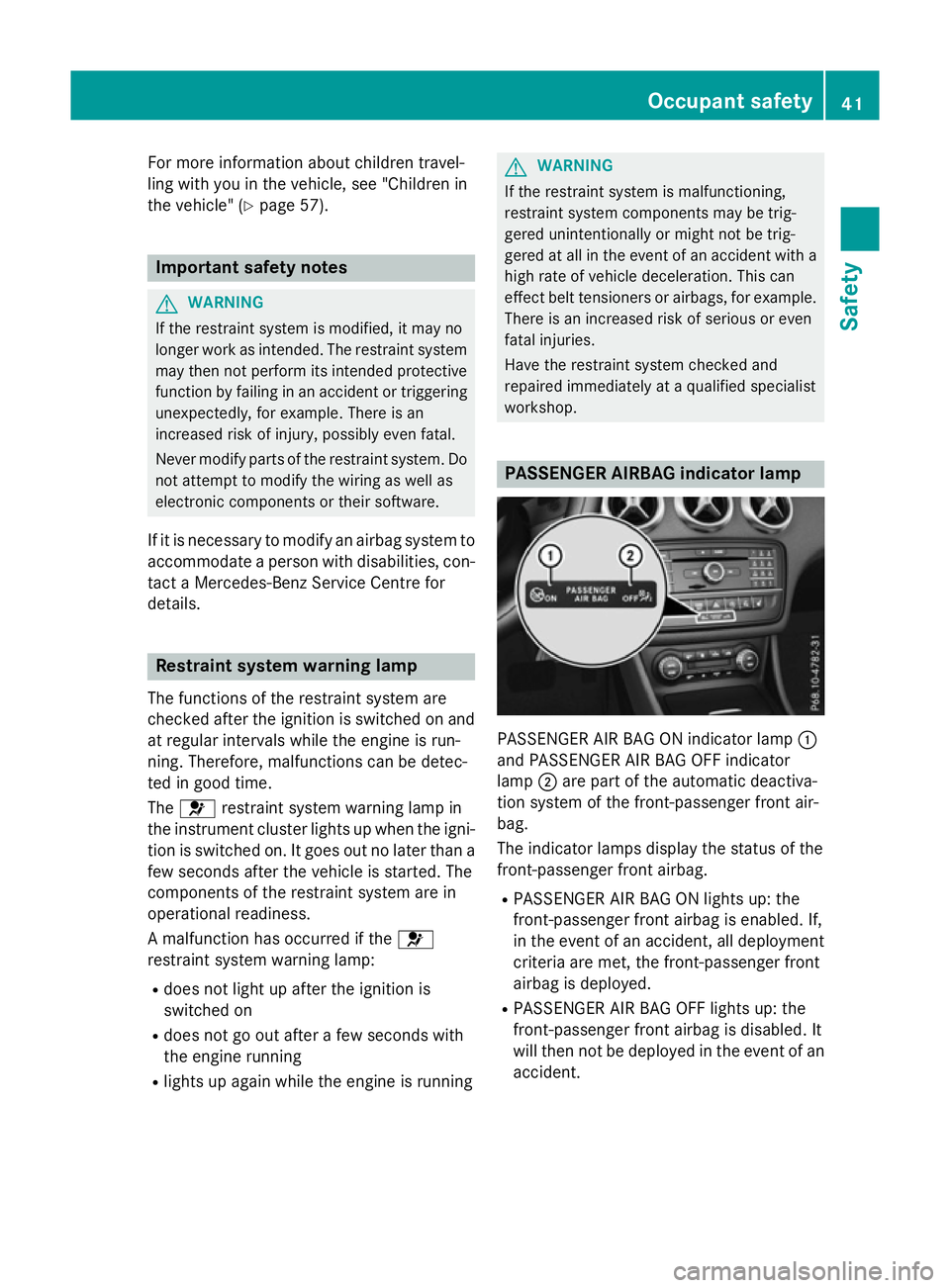
For more information about children travel-
ling with you in the vehicle, see "Children in
the vehicle" (Y page 57). Important safety notes
G
WARNING
If the restraint system is modified, it may no
longer work as intended. The restraint system
may then not perform its intended protective function by failing in an accident or triggering
unexpectedly, for example. There is an
increased risk of injury, possibly even fatal.
Never modify parts of the restraint system. Do not attempt to modify the wiring as well as
electronic components or their software.
If it is necessary to modify an airbag system to
accommodate a person with disabilities, con- tact a Mercedes-Benz Service Centre for
details. Restraint system warning lamp
The functions of the restraint system are
checked after the ignition is switched on and
at regular intervals while the engine is run-
ning. Therefore, malfunctions can be detec-
ted in good time.
The 6 restraint system warning lamp in
the instrument cluster lights up when the igni- tion is switched on. It goes out no later than afew seconds after the vehicle is started. The
components of the restraint system are in
operational readiness.
A malfunction has occurred if the 6
restraint system warning lamp:
R does not light up after the ignition is
switched on
R does not go out after a few seconds with
the engine running
R lights up again while the engine is running G
WARNING
If the restraint system is malfunctioning,
restraint system components may be trig-
gered unintentionally or might not be trig-
gered at all in the event of an accident with a high rate of vehicle deceleration. This can
effect belt tensioners or airbags, for example. There is an increased risk of serious or even
fatal injuries.
Have the restraint system checked and
repaired immediately at a qualified specialist
workshop. PASSENGER AIRBAG indicator lamp
PASSENGER AIR BAG ON indicator lamp
:
and PASSENGER AIR BAG OFF indicator
lamp ;are part of the automatic deactiva-
tion system of the front-passenger front air-
bag.
The indicator lamps display the status of the
front-passenger front airbag.
R PASSENGER AIR BAG ON lights up: the
front-passenger front airbag is enabled. If,
in the event of an accident, all deployment
criteria are met, the front-passenger front
airbag is deployed.
R PASSENGER AIR BAG OFF lights up: the
front-passenger front airbag is disabled. It
will then not be deployed in the event of an
accident. Occupant safety
41Safety Z
Page 45 of 417
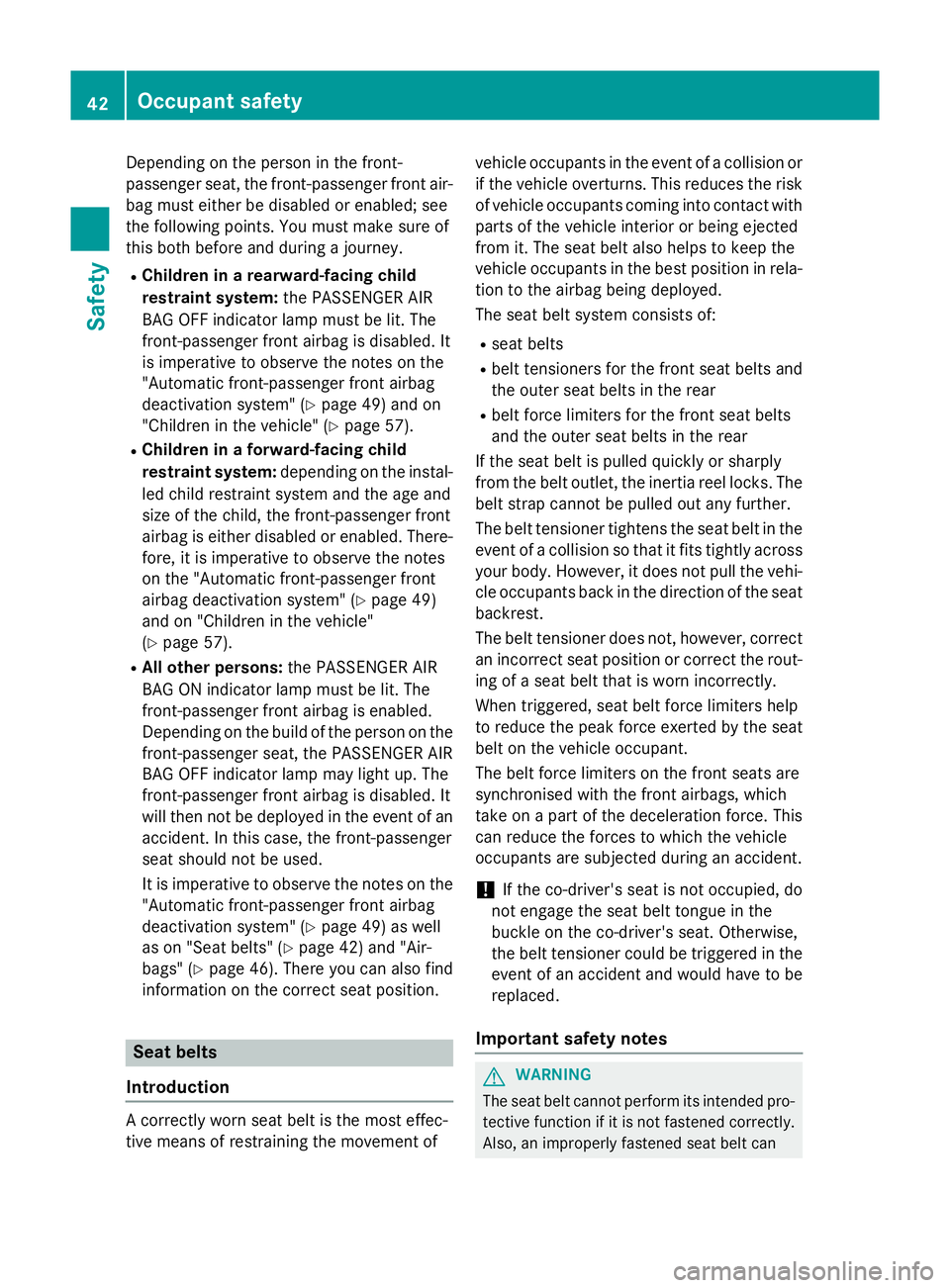
Depending on the person in the front-
passenger seat, the front-passenger front air-
bag must either be disabled or enabled; see
the following points. You must make sure of
this both before and during a journey.
R Children in a rearward-facing child
restraint system: the PASSENGER AIR
BAG OFF indicator lamp must be lit. The
front-passenger front airbag is disabled. It
is imperative to observe the notes on the
"Automatic front-passenger front airbag
deactivation system" (Y page 49) and on
"Children in the vehicle" (Y page 57).
R Children in a forward-facing child
restraint system: depending on the instal-
led child restraint system and the age and
size of the child, the front-passenger front
airbag is either disabled or enabled. There-
fore, it is imperative to observe the notes
on the "Automatic front-passenger front
airbag deactivation system" (Y page 49)
and on "Children in the vehicle"
(Y page 57).
R All other persons: the PASSENGER AIR
BAG ON indicator lamp must be lit. The
front-passenger front airbag is enabled.
Depending on the build of the person on the
front-passenger seat, the PASSENGER AIR
BAG OFF indicator lamp may light up. The
front-passenger front airbag is disabled. It
will then not be deployed in the event of an accident. In this case, the front-passenger
seat should not be used.
It is imperative to observe the notes on the
"Automatic front-passenger front airbag
deactivation system" (Y page 49) as well
as on "Seat belts" (Y page 42) and "Air-
bags" (Y page 46). There you can also find
information on the correct seat position. Seat belts
Introduction A correctly worn seat belt is the most effec-
tive means of restraining the movement of vehicle occupants in the event of a collision or
if the vehicle overturns. This reduces the risk of vehicle occupants coming into contact with
parts of the vehicle interior or being ejected
from it. The seat belt also helps to keep the
vehicle occupants in the best position in rela-
tion to the airbag being deployed.
The seat belt system consists of:
R seat belts
R belt tensioners for the front seat belts and
the outer seat belts in the rear
R belt force limiters for the front seat belts
and the outer seat belts in the rear
If the seat belt is pulled quickly or sharply
from the belt outlet, the inertia reel locks. The belt strap cannot be pulled out any further.
The belt tensioner tightens the seat belt in the
event of a collision so that it fits tightly across
your body. However, it does not pull the vehi- cle occupants back in the direction of the seat
backrest.
The belt tensioner does not, however, correct an incorrect seat position or correct the rout-
ing of a seat belt that is worn incorrectly.
When triggered, seat belt force limiters help
to reduce the peak force exerted by the seat
belt on the vehicle occupant.
The belt force limiters on the front seats are
synchronised with the front airbags, which
take on a part of the deceleration force. This
can reduce the forces to which the vehicle
occupants are subjected during an accident.
! If the co-driver's seat is not occupied, do
not engage the seat belt tongue in the
buckle on the co-driver's seat. Otherwise,
the belt tensioner could be triggered in the
event of an accident and would have to be
replaced.
Important safety notes G
WARNING
The seat belt cannot perform its intended pro- tective function if it is not fastened correctly. Also, an improperly fastened seat belt can 42
Occupant safetySafety